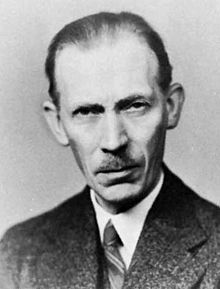Johannes Nicolaus Brønsted
| Johannes Nicolaus Brønsted | |
|---|---|

Portrait of Johannes Brønsted
|
|
| Born |
22 February 1879 Varde, Denmark |
| Died | 17 December 1947 (aged 68) Copenhagen, Denmark |
| Residence | Copenhagen, Denmark |
| Nationality | Danish |
| Fields | Physical chemistry |
| Institutions | University of Copenhagen |
| Alma mater | University of Copenhagen |
| Known for |
Brønsted-Lowry acid-base theory Brønsted catalysis equation |
Johannes Nicolaus Brønsted (Danish pronunciation: [joˈhanˀəs ˈneɡ̊olɑʊ̯ˀs ˈb̥ʁɶnsd̥ɛð] 22 February 1879 – 17 December 1947) born in Varde, was a Danish physical chemist. He earned a degree in chemical engineering in 1899 and his Ph.D. in 1908 from the University of Copenhagen and was immediately thereafter appointed professor of inorganic and physical chemistry at the same university.
In 1906 he published the first of his many papers on electron affinity, and, simultaneously with the English chemist Thomas Martin Lowry, he introduced the protonic theory of acid-base reactions in 1923. That same year, Gilbert N. Lewis proposed an electronic theory of acid-base reactions, but both theories remain commonly used.
He became known as an authority on catalysis by acids and bases and was the namesake of the Brønsted catalysis equation. Working with Lowry, he also developed the often-used theory of proton donation, theorizing that a hydrogen atom (which is always found in an acid) ionizes into hydronium upon dissolving in water, thereby losing its electron and becoming a proton donor, and that hydroxide (a water molecule stripped of one of its two hydrogen atoms) is a proton receiver. Mixing the two causes a neutralization reaction wherein hydronium and hydroxide combine, creating hydrogen hydroxide, a compound otherwise known as water. The pH scale may be interpreted as "power of hydrogen", and the definition is based on the work of Brønsted and Lowry.
...
Wikipedia
